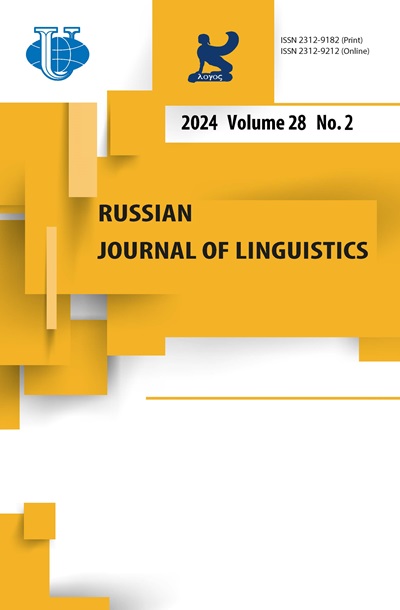Russian Journal of Linguistics
Editor-in-Chief: Dr. Tatiana Larina, PhD (Philology), Professor
ISSN: 2687-0088 (Print) ISSN: 2686-8024 (Online)
Founded in 1997 г. Publication frequency: quarterly. ![]()
Peer-Review: double blind. APC: no article processing charge.
Publication language: Russian, English
PUBLISHER: Peoples’ Friendship University of Russia named after Patrice Lumumba (RUDN University)
Indexation: Scopus, Web of Science Core Collection (ESCI), RSCI, Russian Index of Science Citation, Google Scholar, Ulrich's Periodicals Directory, WorldCat, East View, ERICH Plus, DOAJ, Dimensions, ResearchBib, Lens, Research4Life, JournalTOCs, British Library, Bodleian Libraries (University of Oxford), Ghent University Library
The Russian Journal of Linguistics is a peer-reviewed international academic journal publishing research in Linguistics and related fields. It is international with regard to its editorial board, contributing authors and thematic foci of publications.
The aims of the journal:
- to promote scholarly exchange and cooperation among Russian and international linguists and specialists in all subfield of linguistics;
- to disseminate theoretically grounded research and advance knowledge pertaining to the field of linguistics developed both in Russia and abroad;
- to publish results of original research on a broad range of interdisciplinary issues relating to language, culture, cognition and communication;
- to promote the development and understanding of language use in different sociocultural contexts.
The journal covers functional and socio-cognitive aspects of different languages and publishes a wide range of interdisciplinary studies that focus on the effect of sociocultural contexts on language development and use. This special approach allows the editors to publish research from a broad range of different linguistics subfields such as language and culture, comparative linguistics, sociolinguistics, psycholinguistics, cognitive linguistics, pragmatics, discourse analysis, intercultural communication, theory and practice of translation.
A distinctive feature of the journal is regular thematic issues devoted to the most significant linguistic problems. Invited co-editors of such issues can be both Russian and international scholars. A diverse and deep study of the ambiguous problems of linguistics by scholars from different countries and various linguistic schools contributes to the clarification of positions on contentious issues and the development of optimal research principles.
In addition to research articles, the journal welcomes book reviews, literature overviews, conference reports and research project announcements.
Announcements
Conversations with readers and authors - 10Posted: 12.06.2024
5 June 2024 the Russian Journal of Linguistics held its 10th webinar "Conversations with Readers and Authors” on the topic Metaphor across Languages, Cultures and Discourses. Such prominent scholars as Zoltán Kovecses, Ana Rommel, Aseel Zibin, Olga Solopova, Anna Leonteva, Alan Cienki and Olga Agafonova presented their papers. More than 70 Russian and international scholars and students from Italy, Hungary, India, the Netherlands, Jordan, India and China joined the webinar and had an opportunity to ask their questions to the presenters and participate in the discussion. |
Conversations with readers and authors: Metaphor across Languages, Cultures and DiscoursesPosted: 03.06.2024
The Russian Journal of Linguistics continues to organise a series of webinars “Conversations with readers and authors” We invite our readers to discuss the publications in the Special Issue and others of the Russian Journal of Linguistics on the topic Metaphor across Languages, Cultures and Discourses on June 5 2024 6.00pm Moscow time in Teams. Link - https://bit.ly/RJL-10 Registration form - https://docs.google.com/forms/d/1Hmu3VDvfenB7HdVjU-nTpEb40xNOQxQ_zm-0FvmUO0I/edit |
| More Announcements... |
Favorite articles

Hyperbole and emotionalisation: Escalation of pragmatic effects of proverb and metaphor in the “Brexit” debate
Vol 25, No 3 (2021): Emotionalisation of Media Discourse
Narrativised simile and emotional responses to Brexit
Vol 25, No 3 (2021): Emotionalisation of Media Discourse
“Semantic Primitives”, fifty years later
Vol 25, No 2 (2021): QS Subject Focus Summit 2020 on Modern Languages and Linguistics
Comparing languages and cultures: Parametrization of analytic criteria
Vol 25, No 2 (2021): QS Subject Focus Summit 2020 on Modern Languages and Linguistics
Applied translation studies and transdisciplinary action research: Understanding, learning and transforming translation in professional contexts
Vol 25, No 2 (2021): QS Subject Focus Summit 2020 on Modern Languages and Linguistics
A Program for the Preservation and Revitalization of the Languages of Russia
Vol 25, No 2 (2021): QS Subject Focus Summit 2020 on Modern Languages and Linguistics














